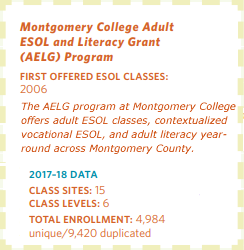-
Program
Administrator
ToolkitA Guide to Implementing and Managing Community-Based Adult ESOL Classes and Programs
-
You are here
Chapter 14: Assessment for Learner Gains
Ensuring Student Success- Chapter 14
Assessment for Learner Gains
♦ PRACTICE EXAMPLE
 Bender JCC of Greater Wshington
Bender JCC of Greater Wshington
Stacy Katz-Olivera, Former Adult Program CoordinatorGateway Seniors ESOL Program
FIRST OFFERED GATEWAY SENIORS: 1993
Bender JCC runs one of a few programs in the county that are mainly geared toward seniors.
2017–18 DATA
CLASS SITES: 1 CLASS LEVELS: 4 TOTAL ENROLLMENT: 64 unique/124 duplicatedStacy discusses some of the challenges they have with assessing and promoting students in their Gateways ESOL program for seniors:
“We often encounter a stumbling block with our students over the topic of assessments or evaluations. Just the idea of knowing that those things are part of our program frightens them. We are lucky to have an instructor who spends extra time with the students, just talking with them. Asking questions about the program, but in a way that does not come across as anything other than small talk. The students have taken to her and they have become comfortable speaking with her more freely about the program and their progress. As for promoting them to the next level, it is really on a case-by-case basis.
We are lucky to have an instructor who spends extra time with the students, just talking with them.
As my students do NOT like change, I will suggest they move to the next level, but the reality is they are going to stay with their teacher and grow with them; otherwise, they move on to a Citizenship Class. We have some students who have been with the same teacher for over 15 years. Not an ideal situation but that is who my students are.”
♦ NOTES FROM THE FIELD
 Margaret Shrager, Former Intake and Assessment Specialist in the Adult ESOL and Literacy Grant (AELG) program at Montgomery College, discusses an approach to the challenges of using a standardized test to figure out whether a student should pass or not.
Margaret Shrager, Former Intake and Assessment Specialist in the Adult ESOL and Literacy Grant (AELG) program at Montgomery College, discusses an approach to the challenges of using a standardized test to figure out whether a student should pass or not.What is the challenge with using standardized tests to decide if students should pass the class?
“Using standardized tests such as CASAS or TABE as the pretest and posttest to determine whether or not a student should move up to the next level can be challenging. They are aligned to National Reporting System (NRS) levels, which we use in the program, and are generally reliable.But they may not always give a complete picture of how well the student met all the outcomes of the level. For example, on the posttest day, the student may have been tired, may not take tests well, or may just not be used to the format of this test based on their educational background. Additionally, the tests only measure certain skills—in our case, listening and reading. Productive skills are not measured at all on these tests, which is an important factor to consider when placing students.“
We start with the CASAS scores. If they are not close to the next level, they stay in the same level.
So what do you do?
“We use listening and reading CASAS tests at AELG and follow all regulations and CASAS guidelines related to reporting the scores and completion rates as mandated by our funders. However, for internal decisions related to what class to put them in for subsequent sessions, we have some flexibility. We always start with the CASAS scores. If the listening and reading scores are not close to the scores they need to move to the next level, they will stay in the same level. However, if one of the test scores demonstrates they should move up, and the other is close to the move-up score, instructors can make a recommendation for the student to move to the next level based on other assessments they have done in class. For example, if the student is in a high beginning class and has a reading posttest score that puts them solidly in the low intermediate range and a listening score that is a couple of points short of the low intermediate cutoff, the instructor will indicate on their intake form what level they think the student should be in next and why. It is only a recommendation, though. I make all final decisions and will look at other factors, such as whether this was the first time the student has taken the level and how they did on tests in previous classes, before deciding which level is appropriate for the student.“

